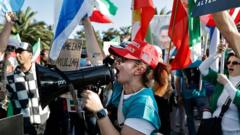Can the Tehrangeles Community in LA Revive Iran's Greatness Amid US Strikes?

Understanding the Iranian American Perspective Amidst Current Conflicts
In recent times, the Iranian American community, particularly in areas like West Los Angeles—often referred to as "Tehrangeles"—has been vocal about their opinions regarding the geopolitical tensions involving Iran. The community’s response is multifaceted, reflecting a blend of historical grievances, cultural identity, and contemporary political concerns. This article aims to delve into the complexities of the Iranian American experience, particularly how they are navigating their dual identities while engaging with the ongoing conflict involving Iran and the United States.
The Iranian American Community: A Brief Overview
West Los Angeles is home to the largest population of Iranians outside of Iran. This diverse community has brought with it a rich cultural heritage, including Persian restaurants, bookstores, and shops that sell traditional Iranian goods, such as saffron and rose ice cream. The community is not monolithic; rather, it consists of individuals with different backgrounds, beliefs, and opinions, particularly regarding the political situation in Iran and the role of the United States in that context.
Many Persian Americans fled Iran following the 1979 Islamic Revolution, seeking refuge from a regime they viewed as oppressive. These individuals often carry with them memories of their homeland, and their experiences have shaped their views on current events. As a result, they have developed a strong sense of community, often rallying together to support causes that resonate with their personal histories.
Protests in West LA: A Microcosm of Broader Tensions
Protests have become a common sight outside the West LA Federal Building, where the Iranian American community frequently gathers to express their views. One notable protest saw participants chanting for "regime change" in Iran, with some wearing "Make America Great Again" hats. The atmosphere was charged, with a blend of Persian music, dancing, and the waving of American, Israeli, and Iranian flags. This unusual blend of symbolism highlights the complex relationship many Iranian Americans have with both their home and adopted countries.
Leaders like Bita Ashrafi, who has lived in the United States for over 50 years, strongly support President Trump's stance on Iran. Ashrafi articulated her belief that the Iranian regime has perpetuated tyranny and dictatorship for over four decades, asserting that military intervention is necessary for change. Her viewpoint reflects a segment of the community that sees American support as pivotal in the fight against oppressive regimes.
Divided Opinions: A Tapestry of Views
While many Iranian Americans express support for regime change and military intervention, others voice their concerns about the implications of U.S. involvement. Farzan Seyed, who wore a "Make Iran Great Again" hat, emphasizes that the decision for change should come from the Iranian people themselves. He hopes for support of exiled figures like Crown Prince Reza Pahlavi but cautions against excessive American intervention, believing it could strengthen the existing regime.
Roozbeh Farahanipour, a former political prisoner in Iran, echoes these concerns. He argues that U.S. involvement could lead to a destabilized and uncertain future for Iran, drawing parallels to past American interventions in Iraq and Afghanistan. His perspective highlights a critical divide within the Iranian American community—while some advocate for direct action, others emphasize the importance of self-determination for the Iranian people.
Historical Context: The Legacy of Revolution and Activism
The Iranian Revolution of 1979 is a pivotal moment in the collective memory of Iranian Americans. Many fled Iran during this period, carrying with them stories of oppression and loss. This historical context shapes their responses to current events. Activists like Farahanipour and Elham Yaghoubian, who have worked tirelessly for years to advocate for human rights and social justice, are prime examples of how past experiences influence present-day activism.
Yaghoubian, who has historically opposed military action, now believes that current geopolitical dynamics may provide an opportunity for change. Her perspective reveals how shifting circumstances can reshape opinions within the community, highlighting the importance of dialogue and debate among Iranian Americans.
Amidst Conflict: Community Resilience and Solidarity
Despite the polarization of opinions, the Iranian American community continues to exhibit solidarity in their shared concerns for loved ones back in Iran. Many express fears concerning the well-being of family members amidst escalating tensions and potential military actions. The ongoing conflict has fostered a sense of camaraderie, as individuals come together to support one another. Writer and actor Mary Apick notes the remarkable acts of kindness and solidarity witnessed amongst Iranians in Iran, who are helping each other amidst the chaos.
Looking Ahead: The Future of the Iranian American Community
The Iranian American community stands at a crossroads as they grapple with the complexities of their dual identities and the evolving political landscape. With differing opinions on how to approach the situation in Iran, it is crucial for the community to maintain open channels of communication. Engaging in thoughtful dialogue can lead to a more nuanced understanding of the challenges facing both Iranian Americans and those still in Iran.
As events continue to unfold, it is essential for the community to remain active participants in the discourse surrounding U.S. foreign policy and its implications. The resilience and activism of Iranian Americans can play a significant role in shaping the narrative, ensuring that the voices of those who have experienced oppression are heard and valued.
Frequently Asked Questions
What is the significance of the term "Tehrangeles"?
Tehrangeles is a colloquial term that refers to West Los Angeles, which has the largest concentration of Iranians in the United States. It highlights the cultural and social identity of the Iranian American community in this region.
Why do some Iranian Americans support military intervention in Iran?
Some Iranian Americans view military intervention as a necessary step toward regime change, believing that external pressure can help dismantle oppressive systems and promote democracy in Iran.
What are the differing opinions within the Iranian American community regarding U.S. involvement in Iran?
Opinions range from strong support for U.S. intervention to calls for self-determination among the Iranian people. Some fear that American involvement may exacerbate the situation and strengthen the regime, while others believe it could lead to positive change.
How do Iranian Americans maintain their cultural identity in the United States?
Many Iranian Americans maintain their cultural identity through community events, celebrations of Persian heritage, and the establishment of businesses that reflect their cultural roots. This helps to create a sense of belonging and community cohesion.
What role do Iranian Americans play in advocating for change in Iran?
Iranian Americans often engage in activism, lobbying, and public demonstrations to raise awareness about the situation in Iran, promote human rights, and call for policy changes in U.S. foreign relations with Iran.
As the situation in Iran continues to evolve, the Iranian American community will undoubtedly play a crucial role in shaping the narrative and advocating for the change they wish to see. Their resilience, diversity of thought, and shared experiences will be instrumental in navigating this complex landscape. What do you think is the best path forward for the Iranian American community as they engage with these pressing issues? #Iran #IranianAmerican #Geopolitics
Published: 2025-06-25 16:00:23 | Category: technology



